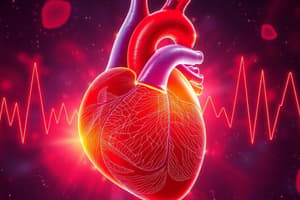Podcast
Questions and Answers
Which vessel is more compliant according to the text?
Which vessel is more compliant according to the text?
- Capacitance vessels
- Arteries
- Venules
- Veins (correct)
What happens to blood volume in the venous circulation if compliance increases?
What happens to blood volume in the venous circulation if compliance increases?
- Cannot be determined
- Increases (correct)
- Remains unchanged
- Decreases
What is the relationship between resistance and flow according to the text?
What is the relationship between resistance and flow according to the text?
- No relationship
- Varies unpredictably
- Inversely proportional (correct)
- Directly proportional
How does viscosity affect resistance according to Poiseuille’s law?
How does viscosity affect resistance according to Poiseuille’s law?
What factor can help increase stroke volume by increasing preload on the heart?
What factor can help increase stroke volume by increasing preload on the heart?
What happens to stroke volume, cardiac output, and blood to the brain when there is no venous return from the legs?
What happens to stroke volume, cardiac output, and blood to the brain when there is no venous return from the legs?
What is the primary determinant of afterload?
What is the primary determinant of afterload?
What factor can increase cardiac workload without increasing cardiac output?
What factor can increase cardiac workload without increasing cardiac output?
What primarily determines heart rate?
What primarily determines heart rate?
Which factor can increase vascular tension and subsequently increase blood pressure?
Which factor can increase vascular tension and subsequently increase blood pressure?
What do baroreceptors do when stretched due to high pressure?
What do baroreceptors do when stretched due to high pressure?
What is the effect of baroreceptor stimulation?
What is the effect of baroreceptor stimulation?
What is the effect of chronic hypertension on baroreceptors?
What is the effect of chronic hypertension on baroreceptors?
What is the primary factor in the regulation of blood pressure?
What is the primary factor in the regulation of blood pressure?
What does the SNS primarily release at the smooth muscle of most arteries?
What does the SNS primarily release at the smooth muscle of most arteries?
What is the effect of increased afterload on stroke volume?
What is the effect of increased afterload on stroke volume?
What is the primary determinant of flow per minute (Q) in the given equation Q=P1-P2 R?
What is the primary determinant of flow per minute (Q) in the given equation Q=P1-P2 R?
How does doubling the radius of a vessel affect resistance?
How does doubling the radius of a vessel affect resistance?
Which part of the vascular system primarily alters blood flow through vasodilation and vasoconstriction?
Which part of the vascular system primarily alters blood flow through vasodilation and vasoconstriction?
What is the primary determinant of stroke volume (SV)?
What is the primary determinant of stroke volume (SV)?
How is mean arterial pressure (MAP) calculated?
How is mean arterial pressure (MAP) calculated?
What is the relationship between blood velocity and the cross-sectional area of vessels?
What is the relationship between blood velocity and the cross-sectional area of vessels?
What determines the force generated by muscle fibers in the heart?
What determines the force generated by muscle fibers in the heart?
Which factor influences blood pressure by determining cardiac output (CO)?
Which factor influences blood pressure by determining cardiac output (CO)?
What can overstretching the heart lead to?
What can overstretching the heart lead to?
What type of flow in vessels moves smoothly in the center and can cause thrombus formation at vessel walls?
What type of flow in vessels moves smoothly in the center and can cause thrombus formation at vessel walls?
Which vessels are the primary sites of regulation of vascular flow?
Which vessels are the primary sites of regulation of vascular flow?
What is the primary determinant of blood pressure and blood flow regulation?
What is the primary determinant of blood pressure and blood flow regulation?
Flashcards are hidden until you start studying
Study Notes
Cardiac Output, Blood Pressure, and Blood Flow Regulation
- Resistance (r4) is the primary determinant of Q=P1-P2 R, where Q is flow per min, P is pressure, and R is resistance
- Resistance is inversely proportional to radius4; doubling the radius decreases resistance 16 times, increasing blood flow
- Vascular system primarily uses resistance to alter blood flow, through vasodilation and vasoconstriction of arterioles
- Arterioles are the primary sites of regulation of vascular flow, and drugs affecting arterioles have direct effects on BP and blood flow
- Blood velocity is inversely proportional to the cross-sectional area of vessels
- Laminar flow in the center of vessels moves smoothly, while turbulent flow at vessel walls can cause thrombus formation
- Arterial pressure pulses include systolic BP, diastolic BP, pulse pressure (PP), and mean arterial pressure (MAP)
- MAP is calculated as [systolic BP + (2 x Diastolic BP)] / 3, an estimation of average blood pressure throughout the cardiac cycle
- Blood pressure is influenced by cardiac output (CO) and vascular resistance, determined by heart rate, stroke volume, and resistance to ejection of blood from the ventricles
- Stroke volume (SV) is determined by preload, which is proportional to venous return, and the Frank-Starling law
- The force generated by muscle fibers is proportional to the initial sarcomere length and the stretch on the individual fibers, allowing the heart to adjust its SV based on venous return
- Overstretching the heart can limit its effective contractions, but this is rare and occurs only in chronic disease
Studying That Suits You
Use AI to generate personalized quizzes and flashcards to suit your learning preferences.




